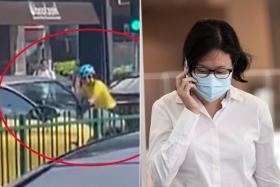Vital features spelt out for proposed laws to fight fake news
It suggests laws to cut off ad revenue to those who spread falsehoods, get them to repay ill-gotten gains
New laws are necessary for the authorities to act swiftly against the spread of online falsehoods, but such legislation needs to be carefully crafted to target only those who knowingly and intentionally spread them, said a parliamentary committee studying ways to deal with fake news.
It also spelt out other vital features for these proposed laws.
They need to respect personal and private communications, avoid harming public interest and cannot be too broad.
This is because they must also take into account that "falsehoods can appear in a broad spectrum of circumstances, from deliberately fabricated content to satire and parodies".
The laws should be able to stop an online falsehood from going viral and do so in a matter of hours.
In addition, the person making such decisions should be effective and credible and the safeguards must be adequate to ensure due process and the proper exercise of power.
These moves will assure people of the integrity of the decision-making process, said the Select Committee on Deliberate Online Falsehoods.
It also suggested the new laws include powers to take down and block access to online fake news and require corrections and notifications to be tagged to it. There must also be judicial oversight where appropriate.
The committee urged the Government to identify extra measures, including legislation, that may be needed to safeguard election integrity, citing that Russia-based purveyors of disinformation were found to have meddled in the 2016 US presidential election.
Another recommendation is for the Government to implement monitoring and early-warning mechanisms that can help determine when and how to intervene to stop the spread of an online falsehood.
The committee also called on the Government to consider what powers it would need to set up a "de-monetisation regime" that will cut off digital advertising revenue to those who start and spread online falsehoods and require them to repay the ill-gotten gains.
"This should cover the 'hired guns' who are paid by others to create and spread online falsehoods," said the committee.
The committee also said criminal sanctions should be imposed on fake news perpetrators, albeit only in justifiable circumstances.
For example, there should be the requisite degree of criminal culpability - intent or knowledge - in line with established criminal justice principles.
It added: "There should be a threshold of serious harm, such as election interference, public disorder and the erosion of trust in public institutions."
Get The New Paper on your phone with the free TNP app. Download from the Apple App Store or Google Play Store now


